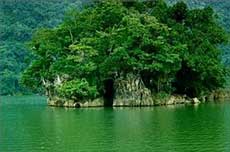The Australian Embassy in Hanoi has provided VND205 million (around AUD10,000) for a waste management project to support environmental conservation and eco-tourism development in Ba Be National Park in northern Bac Kan province.

This project is currently managed by the Bac Kan Pro-Poor Partnership for Agro-forestry Development (3PAD).
Ba Be National Park, situated in Bac Kan Province, is an area of national significance in terms of both forest and biodiversity protection. The Park’s forests are an important source of income for local ethnic minority groups. Three ethnic Tay villages – Coc Toc, Bo Lu and Pac Ngoi of Nam Mau commune – have been chosen for the project due to the high rate of household poverty (52 percent); high dependency on forest resources; and potential for forestry, livestock and ecotourism development.
The project will be administered through local schools and will mainly be run by women and children. It will provide infrastructure needed to establish the safe collection and sale or disposal of waste in Ba Be District. Recyclable waste will become a source of income for the people involved. An environmental education campaign will also be organised to increase understanding of the negative impacts of litter on the environment and on eco-tourism opportunities.
Australian Ambassador to Vietnam, Mr Allaster Cox, said, “marginalised women will have access to income-generating opportunities through the sale of recyclable waste and will receive training in relevant small-business skills. This makes it easy to encourage more people to join such a project as while helping protect the environment, they are helping themselves with more income.â€
“This project also helps promote ‘Clean Up the World’ concepts in Vietnam’s famous and beautiful Ba Be National Park,†he added.
Hoang Van Giap, Director of 3PAD Project Management, appreciated the great support from the Australian Embassy, saying this model will be documented to enable expansion of the project to other villages and areas of the Park and Bac Kan province.
A lack of environmental awareness (on the part of visitors and locals) and inadequate waste management processes and infrastructure have meant that litter has posed a significant threat to the Park environment, the natural beauty of the area and the further development of eco-tourism opportunities.
Ba Be National Park has been recognized as a Natural Preserve Zone since 1977 and is listed as one of twelve priority sites for biodiversity conservation in Vietnam. The park covers an area of 7611 hectares, and includes the largest natural lake in Vietnam. A network of rivers and streams connect the lake to evergreen forests that cover adjacent ranges of limestone mountains.